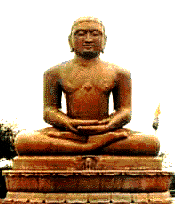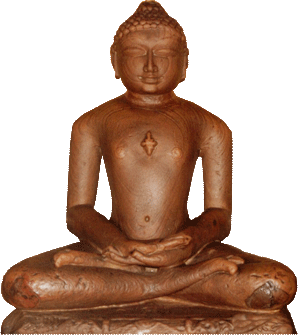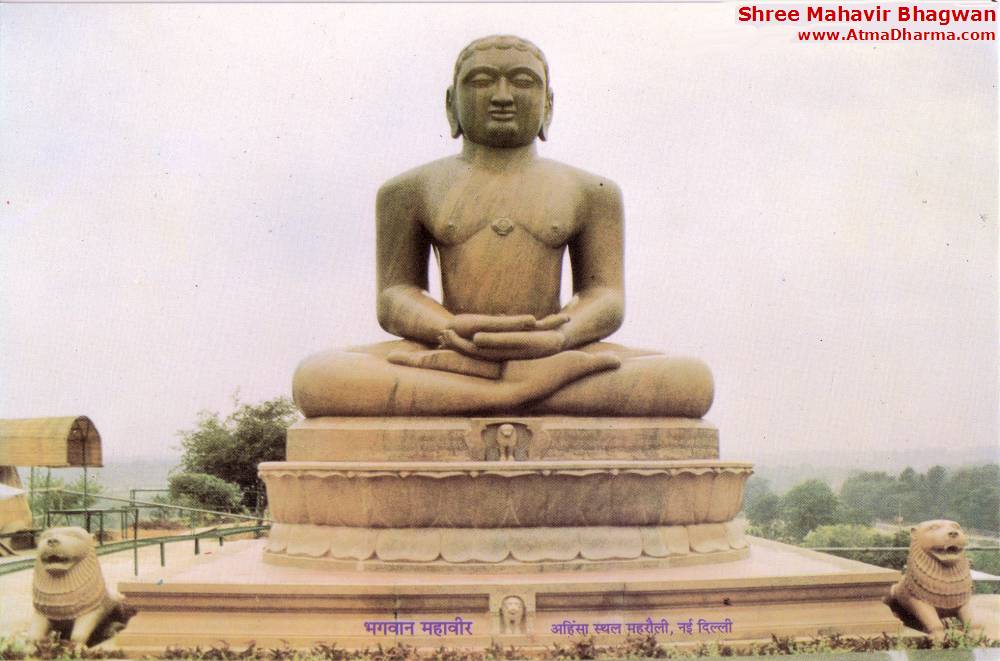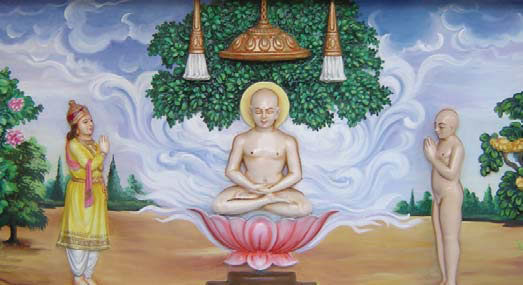
The main Jain festival of the year is Mahavir Jayanti, the birth anniversary of Mahavira, the founder of Jainism.

Mahavir Jayanti is celebrated as the anniversary of Vardhman Mahavir, the founder of Jain religion. Commemorating his birthday on this day, Mahavir was the most revered religious leader in this century and was perceived as a reformer who vehemently opposed the ritualism and false beliefs. The twenty-fourth and last Jain Tirthankara, Mahavir was born in 599 BC and lived for 72 years. He was born of Sidhartha, the Raja of Kundalpura, and Queen Trishala, who was also known by the name Priyakarni.
Mahavir Jayanti is the main Jain festival. Mahavirswami is the twenty-fourth Tirthankar. He was born in 599 BC at Kshatriyakund near modern Patna in Bihar. His father, King Siddhartha, and his mother, Queen Trishla, were very religious people and followers of Lord Parshwanath, the twenty-third Tirthankar. When Queen Trishla was expecting the baby she had 14 beautiful dreams (some believe sixteen dreams). When the learned scholars were asked about the dreams they said she was going to have an extraordinary child., one who will show the path to true happiness to humanity.

His Divine Life
Prince Vardhamana became extremely penitent and resolved to give up everything worldly. He gave up attachment to his parents, friends and relatives. Distributing all his wealth among the poor, he went to the forest and became a monk. Mahavir practised rigorous austerities, including fasts that lasted many days. He meditated on the pure nature of the Soul. Mahavir lived a life of absolute truthfulness, a life of perfect honesty and a life of absolute chastity.

His Teachings
Mahavira taught that people can save their souls from the contamination of matter by living a life of extreme asceticism and by practising non-violence towards all living creatures. This advocacy of non-violence encouraged his followers - monastic and lay - to become strong advocates of vegetarianism. Mahavira's followers were aided in their quest for salvation by the five mahavatars. Attributed to Mahavira, these great vows were the renunciation of killing, of speaking untruths, of greed, of sexual pleasure, and of all attachments to living beings and non-living things.

Sects
The main sects now are the Digambaras and Shvetambaras, with the latter again divided into Deravasis and Sthanakvasis. Whilethe Deravasis visit the temples and worship the statue of Mahavir, the Sthanakvasis emphasise the internalisation of the faith. Mahavir himself was against idol worship.
Celebrations
On the day of Mahavir Jayanthi ( Birth anniversary), many members of the community make offerings of milk, rice, fruit, incense, lamps and water to the tirthankar. Some sections of the community even participate in a grand procession.According to the Digambara school of Jainism, Lord Mahavira was born in the year 615 BC, but the Swetambaras believe that he was born in 599 BC. Both sects however agree that he was the son of Siddhartha and Trisala. Legend has it that he was conceived by Devananda, wife of a Brahmin named Rishabhdeva. It is believed that the gods, ingeniously, transferred the embryo to the womb of Trisala. It is said that the expectant mother had sixteen auspicious dreams before the child was born (only 14 according to the Swetambaras). Astrologers intepreting these dreams, stated that the child would be either an emperor or a Teerthankara.

This religious event is largely observed by the Jains by visiting sacred sites and worshipping the Teerthankara. The event holds special significance in Gujarat and Rajasthan due to the ancient shrines at Girnar and Palitana in Gujarat. Mahavir Jayanti is also celebrated at Parasnath Temple in Kolkata and at Pawapuri in Bihar.
Mahavira, also known as Vardhamana, is the last one in the galaxy of Twenty-four Teerthankaras (Jain Prophets). He was born in the year 599 B.C. and has been acclaimed as one of the greatest prophets of peace and social reformation that Bharat has ever produced. He was born to a pious couple, Siddhartha and Priyakarani or popularly Trishala Devi - who were deeply permeated with the philosophy of jainism preached by Parswanatha, the 23rd Teerthankara. Siddhartha was the king of Kaundinyapura on the outskirts of Vaishali (near Patna in Bihar).
Even as a boy, Mahavira came to be associated with many episodes of absolute fearlessness which earned him the name Mahavira'. He grew up as a prince, excelling in physical prowess as well as intellectual acumen. However, he renounced the pleasures and luxuries of the place, as also the power and prestige of kingship, and undertook a life of intense penance for
more than twelve years. He calmly bore not only the rigors of nature but the torments from the ignorant and mischievous among his own countrymen also. He finally became self-illumined. But not content with his own personal salvation, he chose to become a great human redeemer.
He looked around and found the society corrupted by the distortions of the true concept of Dharma. Violence in the form of animal sacrifice had overshadowed the true spirit of yajna and yaga. Spiritual values had been supplanted by superstitions and lifeless rituals and dogmas. Propitiating various Gods and Goddesses was considered as a means of acquiring religious merit - Punya - to the exclusion of the true spiritual significance of these Vedic practices. Mahavira, with his penetrating insight born out of self-realization, struck mercilessly at these perversions. He simplified the religious procedures and concentrated on righteous conduct.
Mahavira's simple and convincing method of appealing to the highest and noblest impulses in the living breast soon won him a large following. He would, for example, pose the following question in order to bring home the grand message of non-injury to every living being: "Can you hold a red-hot iron rod in your hand merely because some one wants you to do so?" The listeners would instantly reply, "No, never". Then Mahavira would ask them, "Then, will it be right on your part to ask others to do the same thing just to satisfy your desire? If you cannot tolerate infliction of pain on your body or mind by others' words and actions, what right have you to do the same to others through your words and deeds?" Mahavira would then sum up his message: "Do unto others as you would like to be done by. Injury or violence done by your to any life in any form, animal or human, is as harmful as it would be if caused to your own self."
Mahavira's emphasis on this `Unity of Life' forms one of the highest saving principles of human life. The modern civilization, which seeks to exploit and destroy every other kind of living species in order to satiate the never ending cravings of man, is landing the entire human species itself in a deadly peril.
As one deeply conversant with the needs, capacities and aptitudes of human being, Mahavira initiated a simple five-fold path for the householders: Ahimsa (Non-injury - physical or mental - to others), Asteya (non-stealing), Brahmacharya(temperance in sexual pleasures) and Aparigraha (non-acquisition of property).
Mahavira's injunctions for the monks and nuns were however very exacting. Abstinence from every kind of physical comfort and material possession and absolute dedication to the highest ethical and spiritual discipline were enforced. Even to this day, 2500 years after the passing away of that great master, this pure and upright tradition of the monks has been maintained. Thousands of white clad Sanyasins and Sanyasinis and also nude monks move on foot from village to village and town to town, throughout the length and breadth of the country, carrying Mahavira's gospel of peace, non-injury and brotherhood among people.
Mahavira left his mortal coils at the age of 71 on the Deepavali day. But the lamp of peace which he lit continues to glow through the myriad lights of that Festival of Lights.
Mahavira is the last and the greatest Tirthankar of the Jain religion, and Mahavir Jayanti is the birth anniversary of Lord Mahavira, the 24th Tirthankara. Mahavir Jayanti is celebrated in the first day of Bhadrapad, when there is a grand cradle procession, and a general celebration of the auspicious day.

About Mahavira, his Birth and enlightment:
According to the Jain mythology, Mahavir had acquired all the necessery qualities to become a Tirthankara in His pervous life. Six months prior to his birth, the supreme powers created an atmoshphere congenial and condusive to Mahavira's birth, who was a great being. Gods and Goddesses came down to bestow their blessings on the Tirthankara's expecting mother, and to cater to her needs. Wealth was showered from the heavens, relieving everyone from poverty and extending the superior ambience.
Just before Mahavira was born , His mother had sixteen dreams. Mahavira was born at four in the morning, which is considered very auspicious in Jainism and Hinduism.
Her sixteen dreams were:
- A white elephant
- A lion
- Goddess Lakshmi with two elephants at her side showering flowers
- The moon lighting the universe with silvery beams
- A pair of jumping fish
- The radiant sun, a golden pitcher
- A lake full of lotus flowers
- A calm ocean of milk
- A celestial palace
- A throne of rubies and diamonds
- A celestial king ruling the earth
- A garland
- A white bull
- A fragrant Mandara flowers
- and a vase as tall as Mount Meru, filled with gems.
- And immediately after this, she felt a white elephant enter her through her mouth. She also didn't feel any pain associated with childbirth.

It is believed that at the exact moment of his birth, the life forms in all the three worlds were cheerful and content.
Several gods and goddesses descended from the heavens to pay homage to the tirthankara. They bathed him ceremonially and named him Vardhaman, Vir, Mahavira, Ativira and Samvati. The child was of exceptional beauty and developed great physical and
spiritual strength. At the age of thirty, Mahavira renounced the meterial world, and sat for meditation. After 12 years of mediatation under an Ashoke tree, also called Jonesia Ashoka, he attained the uttimate enlightment. The divine Gods witnessed this great event, and carried him in a palanquin to a park where he was put on a five-tiered throne and acknowledged as Mahavira. Here he stripped himself of all his clothes. Instead of shaving his head, he tore his hair out from the roots, for he was above pain. According to the Digambaras, Mahavira wore no clothes thereafter, but the Svetambaras believe that Indra presented him with a white robe.

Mahavira preached non-violence and prohibited any kind of killing. He also believed that the most virtuous life is spent sitting still and fasting, as then a man does not run the risk of injuring life even involuntarily, by swallowing or treading upon insects. On his birth anniversary, every Jain resolves to follow his teachings.
“There is no doubt that Jainism prevailed even before Vardhaman or Parshvanath.” In the 12th century A.D. King Kumarapala was won over to Jainism and made Gujarat a model Jam state. Today the followers of the lain religion form a community of more than one million and a half living in India.
Mahavir is the “Jina” or “Conqueror”, under whose guidance his devotees are encouraged to conquer the karma-rebirth cycle, this being the goal of the lain religion. Mahavir was a kshatriya prince (warrior caste) of North Bihar in Northern India. At the age of 30 he became a wandering ascetic. Thirteen years later he reached illumination. His followers form four orders: monks (muni or sadhu), nuns (sadhvi), laymen (shravaka) and lay-women (shravika).
Digambaras and Shvetambaras
Around the year 80 AD the Jains split into two sects: Digambaras (space clothed) and Shvetambaras (clothed in white). Digambaras hold that sadhus must be naked as a sign of total renunciation. Other doctrines held by the Digambaras but rejected by the Shvetambaras are 1. Only men can obtain final liberation (moksha), women must be reborn as men. 2. The images of the Tirthankars must be represented with downcast eyes, nude and unadorned. 3. Mahavir never married. 4. Once the highest stage of knowledge is reached, a saint can sustain life without eating, and 5. By the 2nd century AD the entire canon of sacred books was lost.

Dash laxanparva
The holiest feast of the Jains is Dashlaxanparva, which is celebrated by the Digambaras from the 5th to the 14th of the
bright half of Bhadrapad. During these days there is an atmosphere of joy in every lain temple. Every day in the morning after taking bath all men and women go to worship in the temple. Then each day there is a lecture on each of the ten chapters of the holy book “Shritatvarth Sutra”. These ten chapters dwell on the following ten duties (dharma):
- Kshama(forgiveness)
- Mardava (humility)
- Arjava (simplicity and frankness)
- Shaucha (cleanliness)
- Satya(truthfulness)
- Samyama (self-control)
- Tap (austerity)
- Tyag (renunciation)
- Akimchanya (detachmen)
- Bramhacharya (celibacy).
On the day dedicated to “tyag” gifts are offered to social service institutions, and on the first day of the dark half of Ashvin, at the end of the celebration, all the men come together and embracing each other they ask pardon for the of-fences committed during the past year.
The 14th day of the bright half of Bhadrapad is known as Anant Chaturdashi (endless fourteenth). This is a very important day for the Jains, this being the last day of the Dashlaxanparva. According to Jam scriptures one can gain much merit by observing a vow on this day. The Jains of the Shvetambara sect celebrate the Paryushan Feast, from the 12th of the dark half of Bhadrapad to the 4th of the bright half of Ashvin.
Ahinsa and Karma
“Ahimsa” or non-hurting” of life is the main principle of Jainism.
“Even unintentionally and the involuntary stepping on an ant may have serious consequences for the soul... Not only living things, but everything in nature must be respectfully treated.”
“There is no place for God in Jainism, which has con-structed a complicated theory of ‘karma’ and karmic mat-ter. Karma is that general energy of the soul that causes its attachment to matter and its subsequent defilement, a kind of link between matter and spirit. All the effort at liberation, therefore, must be directed to controlling karma, and all by autonomous activity. Any mediation of divine grace or forgiveness is rejected as evading the problem of sin, suffering and redemption.
Each person must work out his own deliverance.” According to Jain tradition the wheel of time in this visible world is forever turning. The flow of time is without beginning and without end.
Whatever may be said about the philosophy of Jainism, it must be acknowledged that its practice to a large extent seems to achieve results.

The Birth of Lord Mahavira One night mother Trishla is sleeping in her soft and cozy bed. Suddenly she dreams of auspicious things and gets up. She is filled with an hitherto inexperienced joy and ecstasy.
She had fourteen wonderful dreams. Her dreams filled her with wonder. She never had such dreams before. She narrated herdreams to King Siddharth.

The king called the soothsayers for the interpretation of dreams and they unanimously said, "Sir, her Highness will be blessed with a noble son. The dream augur the vast spiritual realm, the child shall command. Her Highness will become the Universal Mother."
Nine months and fourteen days passed by. It was spring time and the nature was in full bloom. The atmosphere was clean and pure. Cool and fragrant breeze infused joy in every particle in the nature. In the soundless quietude of the midnight, the sky was fluorescent with milky moonlight. The auspicious date was the thirteenth of the bright half of the month of Chaitra.
The moon was in conjunction with the Uttaraphalguni Nakshatra (lunar mansion), the sign of victory. At that auspicious moment Mother Trishla gave birth to a divine child.
Immediately after the birth of prince Vardhaman, Indra, the King of Heaven, arrived with other gods and goddesses. He hypnotized the whole city including mother Trishala and King Siddharth.
He took baby Vardhaman to Mount Meru and bathed him. He proclaimed peace and harmony by reciting Bruhat Shanti during the first bathing ceremony of the new born Tirthankara.

At dawn a maid named Priyamvada rushed to king Siddharth and announced, "Congratulations Sire! Many congratulations! Queen Trishla has given birth to a male child."
Filled with joy and ecstasy the king gave away all the ornaments on his body, save state emblems, to Priyamvada. He also released her from slavery. Thus, a slave woman was freed of her life long slavery just because she was the bearer of the good news of the birth of the Tirthankar.
King Siddharth called his prime minister and ordered, "Tell the officer-in-charge of celebrations to organize unique and special birth celebrations."
After the kings order, all the highways, roads, and lanes in the town of Kshatriyakund were cleared, perfumed water was sprayed, and buntings, garlands, and leaves were lavishly put everywhere. Sweets and gifts were distributed. People danced with joy. The whole town echoed with felicitous songs and music.
Maharaj Siddharth had an inspiration. He called the prime minister and said, "The celebrations of child birth in the royal family are part of the tradition. However, on this particular occasion I want something new, something unique."
The minister humbly submitted, "Sire ! Express your wish and it will be carried out like an order."
King Siddharth said, "Today announce a general amnesty. Free all the prisoners; right off all the debts; distribute money to the needy; allow fifty per cent subsidy on all purchases from all traders; open centers for distribution of food and clothes to the poor, old, and invalid; and liberate old and sick slaves. Thus let the townsfolk join the celebrations free from misery, hunger and bondage.
The order of king Siddharth was carried out. The celebrations continued for ten days with unprecedented enthusiasm. People hailed the occasion and muttered, " Some divine great soul has descended on the earth to liberate the world from pain and misery."

When the name giving ceremonies approached, king Siddharth said to Devi Trishla, "Devi! There has been a continued increase in our wealth, power and happiness. As such I think we should name the child as Vardhaman (ever increasing)."
Queen Trishla consented with joy, "Maharaj ! You are absolutely correct. This child is certainly going to accelerate our all around development."

On the twelfth day after the birth of the child, king Siddharth organized a great feast and invited all his relatives and friends. After meals and other state courtesies, king Siddharth addressed the guests, "Since the day this child was conceived, our family has been blessed with increasing goodwill, respect, wealth, and mutual affection. Cash, gold, and gems have increased in our treasury. The public has gained health, peace, happiness, and goodwill. Thus since the moment this soul has descended, there has been a continued enhancement in our glory, wealth, health, and fame. As such I and Devi Trishla have thought of a befitting name for this child ‘Vardhaman’."
King Siddharth’s suggestion was unanimously approved and the child was formally named Vardhaman.
THE RELIGION
The term 'Jain' has been derived from Jina, which means The Conqueror. Jainism rests on the three-fold path of right conduct, right faith and right knowledge. It does not believe in a single God who absolves the worshippers of their sins. It teaches the practitioners to take complete responsibility for their actions, thereby underlying the Karma theory. It teaches the followers to live a very austere life, in an attempt to clear their debt to mankind and also attain the highest form of salvation.
The devout followers of this religion do not even harm a fly. Some followers cover their mouths with a tiny cloth, in order to avoid the slightest possibility of killing of germs during breathing. It was this doctrine of non-violence (Ahimsa) that was adopted and popularized by Mahatma Gandhi during the freedom struggle.
Jainism can be divided into two sects - the Shwetamabara Jains (ones wearing simple white clothes) and the Digamabara Jains who practice the most extreme form of ascetism by not adorning any clothes on their bodies. Both these schools strictly follow the teachings of Mahavira, who is known as the 'Jina' or the conqueror.

THE SIGNIFICANCE
Mahavir Jayanti is observed on the 13th day of the month of Chaitra as per the Hindu calendar. This day is commemorated, not with pomp and festivities, but with silent prayers and worship, in accordance with Saint Mahavir's teachings of austerity and renunciation.

Jain religious leaders spend the day in solitude, while the rest of the Jain population organises peaceful processions, with children depicting stories from the life and times of Saint Mahavir. Mahavir Jayanti is especially observed in places like Old Delhi, Gujarat and Rajasthan, which consists of a sizeable Jain population. At certain places, (like the highly revered shrines of Girnar and Palitana in Gujarat, Pawanpuri in Bihar and the Parasnath temple in Calcutta), the day is celebrated with a great deal of joy and enthusiasm. Mahavir Jayanti is generally considered auspicious all over the country.
1 comment:
Happy Mahavir jayanti to you, my friend...
Tell all your friend from me,
Sunny, Punjab
Post a Comment